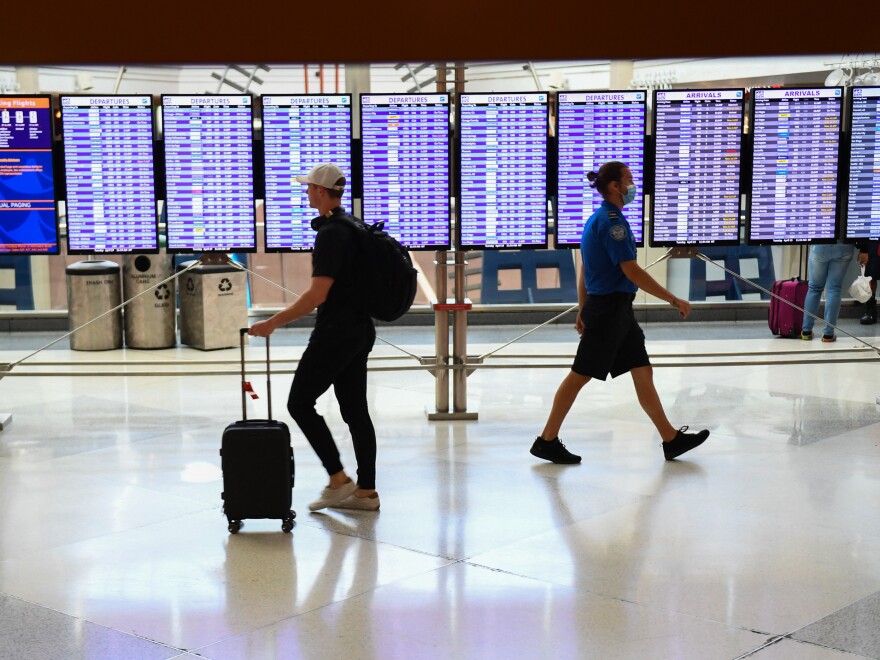When U.S. District Judge Kathryn Kimball Mizelle ended the mask mandate on transportation with the stroke of a pen Monday, the Department of Justice said nothing.
Tuesday, the department said it may appeal if the Centers for Disease Control and Prevention decided masks were still necessary.
Wednesday, Justice officials finally announced they would appeal the decision. But the department still hasn't asked the judge to put a temporary pause on her far-reaching decision while the legal process plays out.
For many observers, this all seems puzzlingly slow. The opinion itself came in for some strongly-worded criticism like "legal abomination" because of its poor reasoning and rejection of established legal norms. To some, her interpretation of the law seemed poised to hamstring CDC now and in the future.
Law professor Stephen Vladeck at the University of Texas has a theory for why the Justice Department may be taking its time.
"If the government's goal was to actually have the mandate be in effect, we would have seen it move faster," he says. "We would expect it to be seeking emergency relief by asking Judge Mizelle to stay her ruling and then – when she says no – by asking the Federal Court of Appeals in Atlanta to freeze her ruling pending the government's appeal."
Instead, the goal may be "to wipe off of the books Judge Mizelle's ruling, striking it down," he explains. "And that doesn't require the government to move nearly as quickly. Indeed, it might even make more sense for the government in that case to actually go a little slowly."
Here's why: The CDC's mask requirement on planes, trains and other modes of transportation was set to expire May 3 anyway. Without a mask mandate in effect, in appealing the case, Vladeck says, "the government can say, 'Look, we're not going to have a chance to argue why Judge Mizelle's ruling was incorrect. Therefore, the proper thing to do is to wipe that ruling off the books and just dismiss this entire lawsuit.' "
This idea goes back to a lawsuit involving Munsingwear, a Minnesota-based underwear company. In the mid-1940s, the government sued the company, alleging it was violating wartime price regulations by overpricing its "heavy knitted underwear," according to news reports from the time. But it took years for the case took to go through the appeals process, and by then the products were no longer subject to price controls, so the controversy was moot.
Enter the Munsingwear doctrine, which the Supreme Court established in its 1950 United States v. Munsingwear decision. Basically, when a dispute becomes moot during the appeals process, the appellate court should generally vacate the lower court's ruling.
"It's a very hard-to-predict doctrine," warns Matthew Lawrence, who teaches law at Emory and used to work at the Department of Justice. "But essentially, in some circumstances, the appellate courts will – in deciding that the case is moot – also wipe it off the books."
"In the CDC mask mandate case, if the district court's ruling were vacated, then it would be as if the court had never ruled – legally speaking," says Lawrence.
Every day that goes by, Vladeck says, the more he thinks the government's strategy may be to wait until the mask mandate expires and then ask the appeals court to wipe Judge Mizelle's ruling off the books, although he notes, "only the government knows what its motives are."
The biggest issue with this appeal, Lawrence says, is the question of who has the power to decide what public health measures are needed. "The district court judge reinterpreted the law to take away CDC's power – to say the CDC could not impose a mask mandate," he says, regardless of how serious the public health threat might be.
"The really important thing about the case now is just clarifying that CDC has the power given it by Congress and the Public Health Services Act, not this more narrow, reinterpreted version of that power issued by the court," he says.
There are risks for the government in appealing Judge Mizelle's decision, he says, but if it had been left unchallenged, her decision would have been a "precedent looming over the CDC."
Copyright 2022 NPR. To see more, visit https://www.npr.org.





